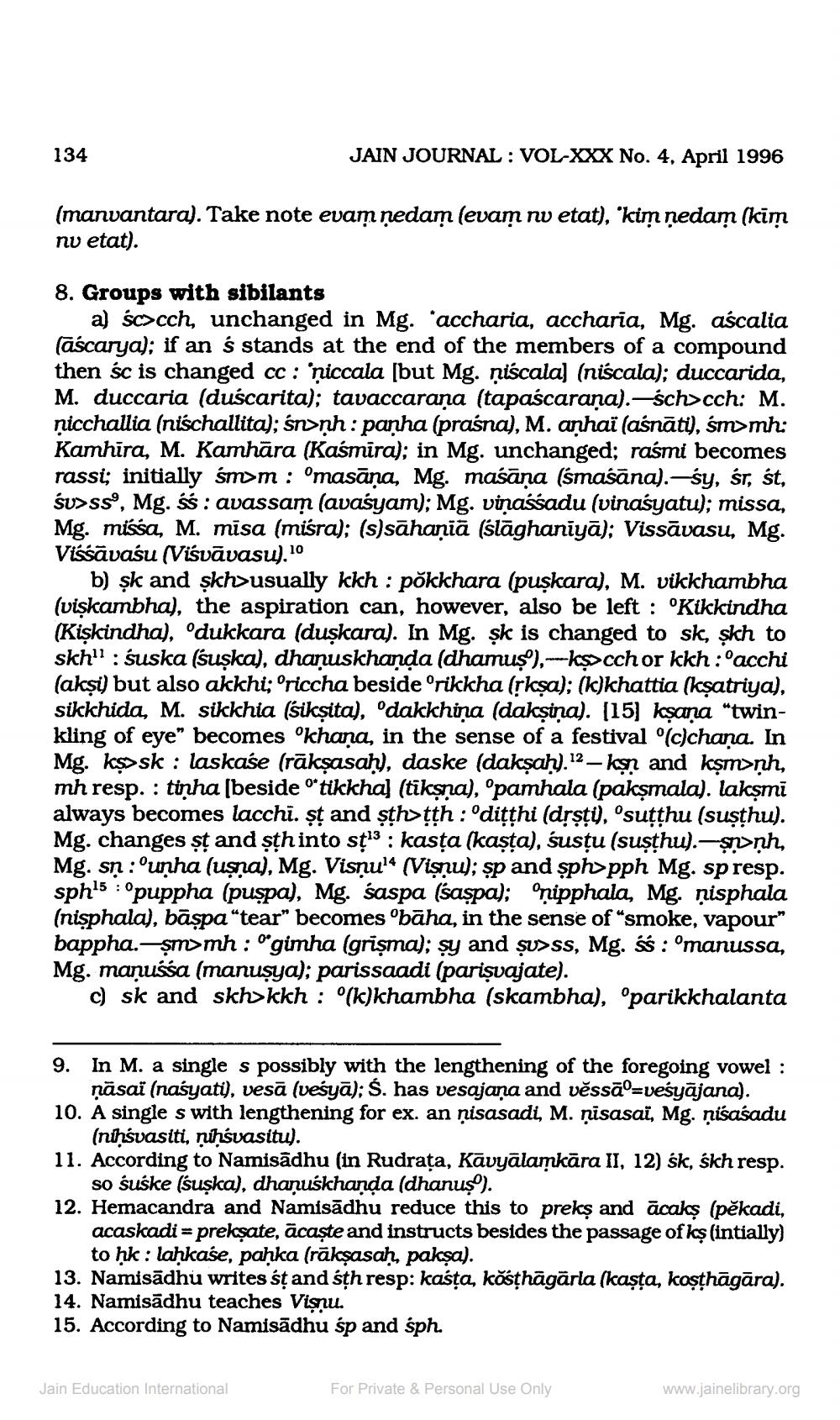________________
134
JAIN JOURNAL: VOL-XXX No. 4, April 1996
(manvantara). Take note evam nedam (evam nu etat), 'kim nedam (kim nv etat).
8. Groups with sibilants
a) śc>cch, unchanged in Mg. "accharia, accharia, Mg. aścalia (aścarya); if an s stands at the end of the members of a compound then śc is changed cc: niccala [but Mg. niscala] (niścala); duccarida, M. duccaria (duścarita); tavaccarana (tapascaraṇa).-sch>cch: M. nicchallia (nischallita); śn>nh:panha (prasna), M. aṇhaï (aśnāti), sm>mh: Kamhira, M. Kamhāra (Kaśmira); in Mg. unchanged; rasmi becomes rassi; initially śm>m: masāṇa, Mg. maśāņa (śmaśāna).-śy, śr, śt, śv>ss, Mg. śś: avassam (avaśyam); Mg. viņaśśadu (vinaśyatu); missa, Mg. missa, M. misa (misra); (s)sāhaniā (slāghaniyā); Vissavasu, Mg. Vissavasu (Viśvāvasu).10
b) şk and ṣkh>usually kkh : põkkhara (puṣkara), M. vikkhambha (viskambha), the aspiration can, however, also be left: Kikkindha (Kişkindha), °dukkara (duṣkara). In Mg. şk is changed to sk, skh to skh11: suska (suska), dhanuskhanda (dhamus),-ks>cch or kkh: 'acchi (akṣi) but also akkhi; riccha beside orikkha (ṛkṣa); (k)khattia (kṣatriya), sikkhida, M. sikkhia (sikṣita), dakkhina (dakṣina). [15] kṣaṇa "twinkling of eye" becomes 'khana, in the sense of a festival (c)chana. In Mg. ks sk: laskase (rākṣasah), daske (dakṣaḥ). 12-kon and kṣm>nh, mh resp.: tinha [beside °*tikkha] (tikṣṇa), °pamhala (pakṣmala). lakṣmi always becomes lacchi. șt and sth>tth: 'diṭṭhi (dṛṣṭi), suṭṭhu (susṭhu). Mg. changes st and sth into st13: kasta (kaṣṭa), susțu (susthu).-sn>nh, Mg. sn: unha (usna), Mg. Visnu' (Visnu); sp and sph>pph Mg. sp resp. sph150puppha (puspa), Mg. saspa (saspa); nipphala, Mg. nisphala (niṣphala), bāṣpa “tear” becomes obāha, in the sense of "smoke, vapour" bappha.-şm>mh: "gimha (grişma); sy and su>ss, Mg. ss: 'manussa, Mg. manussa (manuṣya); parissaadi (pariṣvajate).
c) sk and skh>kkh: (k)khambha (skambha), 'parikkhalanta
9. In M. a single s possibly with the lengthening of the foregoing vowel : ņāsaï (nasyati), vesā (veśyā); Ś. has vesajana and vessāo-vesyājana). 10. A single s with lengthening for ex. an nisasadi, M. nisasaï, Mg. nisaśadu
(niḥsvasiti, niḥsvasitu).
11. According to Namisādhu (in Rudrața, Kāvyālaṇkāra II, 12) sk, skh resp. so suske (suska), dhanuskhanda (dhanus).
12. Hemacandra and Namisādhu reduce this to preks and acaks (pěkadi, acaskadi = prekṣate, acaste and instructs besides the passage of ks (intially) to hk lahkase, pahka (rākṣasaḥ, pakṣa).
13. Namisādhu writes st and sth resp: kasta, kosṭhāgarla (kaṣṭa, koṣṭhāgāra). 14. Namisādhu teaches Visņu.
15. According to Namisādhu sp and sph.
Jain Education International
For Private & Personal Use Only
www.jainelibrary.org




